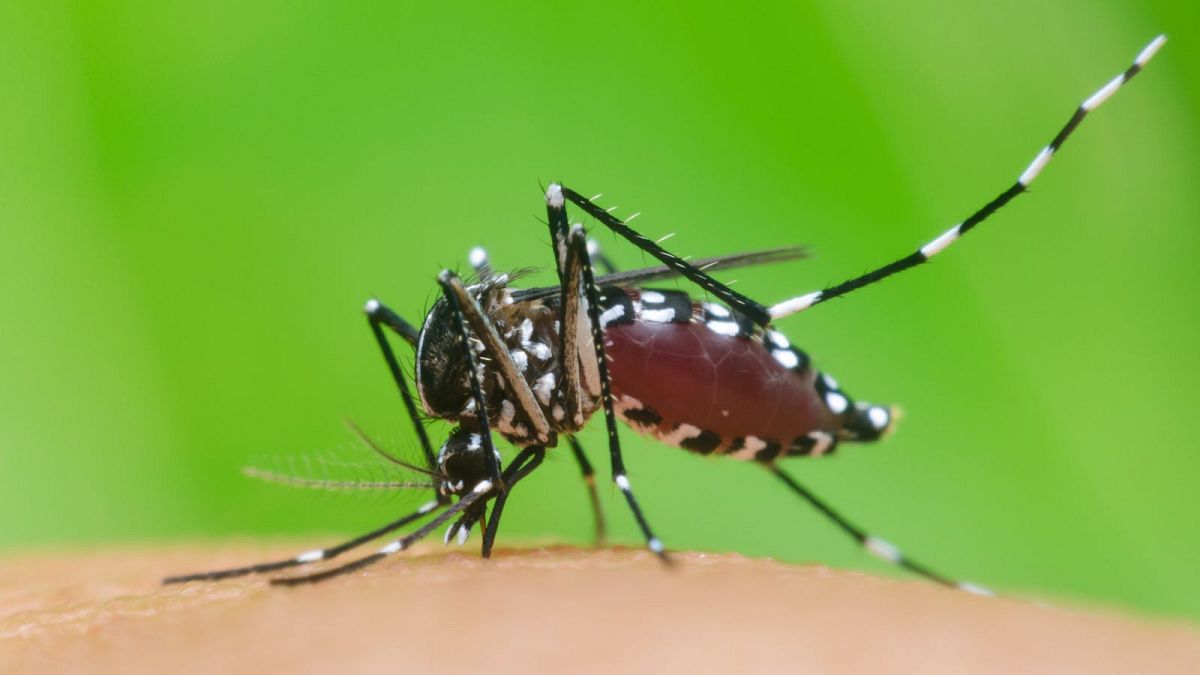European disease experts issue warning about climate-driven mosquitoes

Dengue cases almost doubled in the EU last year, as climate change creates more favourable conditions for vectors.
Climate change is leading to a spike in mosquito-borne disease outbreaks in Europe, according to the latest official figures.
There were 130 locally acquired cases of dengue fever in the EU last year, compared to 71 cases in 2022, the European Centre for Disease Prevention and Control (ECDC) revealed this week.
There has been a recent spike in cases in Europe, with the invasive mosquito species found in 13 EU countries.
Dengue fever is spread by tiger mosquitoes
Dengue – also called break-bone fever because of how bad the joint pain can be – is a viral and potentially fatal infection spread to humans through mosquito bites.
In the decade from 2010 to 2021, only 71 cases in total were reported across the EU.
“Europe is already seeing how climate change is creating more favourable conditions for invasive mosquitos to spread into previously unaffected areas and infect more people with diseases such as dengue,” says ECDC Director Andrea Ammon.
The tiger mosquito (Aedes albopictus) is a carrier of dengue, chikungunya, and Zika viruses. The invasive species is spreading further north, east, and west in Europe – the fastest-warming continent – and now has self-sustaining populations across 13 countries.
Where are tiger mosquitoes spreading in Europe?
So-called for its stripey-looking black and white body, the mosquito was previously only found in tropical areas. It is now embedded in: Austria, Bulgaria, Croatia, France, Germany, Greece, Hungary, Italy, Malta, Portugal, Romania, Slovenia and Spain.
It has also been detected at UK ports several times in recent years, but does not appear to have got a hold on the island yet.
“Increased international travel from dengue-endemic countries will also increase the risk of imported cases, and inevitably also the risk of local outbreaks,” says Ammon.
This is also borne out by the latest ECDC data. More than 4,900 Europeans caught dengue while travelling abroad in 2023 – the highest number of imported cases since surveillance began in 2008 and up from 1,572 cases in 2022.
Climate change and El Nino are spurring on the spread of dengue fever
Last year also saw the highest ever number of dengue cases reported globally, with over 6.5 million reported cases in more than 80 countries – resulting in 7,300 dengue-related deaths.
Several factors are to blame for this epidemic, the World Health Organisation (WHO) says. Firstly, the wider distribution of the dengue-carrying tiger mosquito and the yellow fever mosquito (Aedes aegypti) in previously ‘naïve’ countries.
The El Nino climate phenomenon, combined with climate change, made 2023 the hottest year on record, and led to higher rainfall and humidity – favourable conditions for mosquitoes.
WHO also notes that the disease hit harder in countries facing political and financial instabilities, with high population movements and health systems weakened by the COVID pandemic.
What other diseases are mosquitoes bringing into Europe?
Tiger mosquitoes are not the only troubling species being boosted on the winds of climate change.
The yellow fever mosquito – also a vector of dengue, chikungunya, and Zika viruses – made its way to Cyprus in 2022.
“Its potential for establishment in other parts of Europe is concerning due to its significant ability to transmit pathogens and its preference for biting humans,” the ECDC warns.
In March this year, a locally acquired case of West Nile virus infection was reported in Seville, Spain. “Although an isolated case, it highlights that the transmission of West Nile virus can occur very early in the year, likely due to suitable climatic conditions,” the centre adds.
In Puglia, Italy, the malaria-spreading mosquito Anopheles sacharovi was identified by scientists earlier this year, 50 years after the country was declared free of the disease. Rising temperatures as well as the rewilding of its former habitats are thought to be to blame.
Related
A New Book Argues That What Happens in Europe Doesn’t…
Remaking the World: European Distinctiveness and the Transformation of Politics, Culture, and the Economy by Jerrold Seigel “No issue in world
Poland plans military training for every adult male amid growing…
Poland’s prime minister, Donald Tusk, has said his government is working on a plan to prepare large-scale military training for every adult male in response t
2025 European Athletics Indoor Championships: Ditaji Kambundji secures women’s 60m…
Switzerland’s Ditaji Kambundji walked away from the 2025 European Athletics Indoor Championships in Apeldoorn on 7 March with much more than her first Europea
Takeaways from the EU’s landmark security summit after Trump said…
BRUSSELS (AP) — European Union leaders are trumpeting their endorsement of a plan to free up hundreds of billions of








